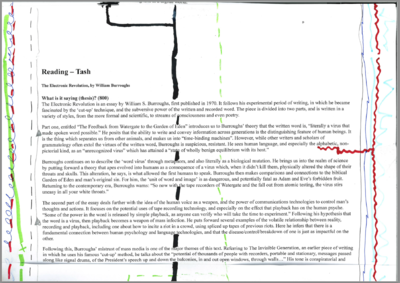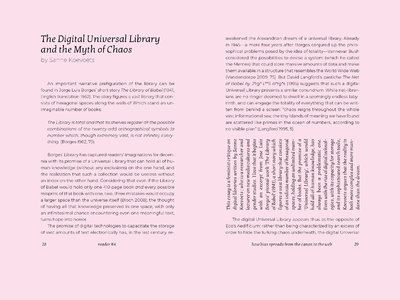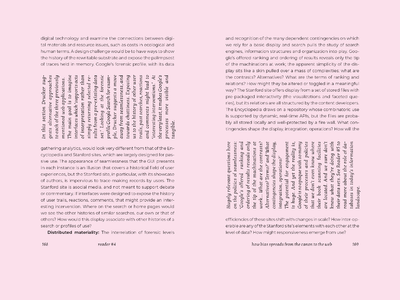User:Tash/RW&RM 02: Difference between revisions
No edit summary |
|||
| Line 1: | Line 1: | ||
== Reading & synopsis writing == | == Reading & synopsis writing == | ||
[[File:ReaderSpread-28-29.png| | [[File:Provisionalreader-tash.png|right|400px| A page from our experimental, analog linked provisional reader]] | ||
[[File:ReaderSpread-168-169.png| | [[File:ReaderSpread-28-29.png|right|400px|Spread from first text in my reader, with synopsis as annotation]] | ||
[[File:ReaderSpread-168-169.png|right|400px|Spread from eighth text in my reader, with synopsis as annotation]] | |||
* synopsis as a form of annotation, of situating and adding context to written content | * synopsis as a form of annotation, of situating and adding context to written content | ||
* writing abstracts, and synopsis as part of research practice, to better understand key elements of texts | * writing abstracts, and synopsis as part of research practice, to better understand key elements of texts | ||
| Line 12: | Line 13: | ||
** Feminism Confronts Technology by Judy Wacjman | ** Feminism Confronts Technology by Judy Wacjman | ||
** Exercises in Style by Raymond Queneau (OULIPO) | ** Exercises in Style by Raymond Queneau (OULIPO) | ||
== Essay writing == | == Essay writing == | ||
Revision as of 18:42, 24 March 2018
Reading & synopsis writing
- synopsis as a form of annotation, of situating and adding context to written content
- writing abstracts, and synopsis as part of research practice, to better understand key elements of texts
- First synopsis: The Electronic Revolution by William Burroughs > on language as tactical media, the written and recorded word as political instrument, and cut-ups as a method of subverting language
- Second synopses: The Digital Universal Library and the myth of chaos by Sanne Koevoets and The Suspicious Archive by James T. Hong > on creating feminist knowledge spaces and archive politics
- Synopses written for the reader: here
- other influential works read this trimester:
- Library of Babel by Jose Luis Borges
- Invisible Generation by William Burroughs
- Feminism Confronts Technology by Judy Wacjman
- Exercises in Style by Raymond Queneau (OULIPO)
Essay writing
- making synopses helped me to get back into my formal / analytical writing practice
- my comparative essay: On female authorship in American and Indonesian literary history
- improvements to make:
- unpack key concepts like feminism and women's role as subject/object – learn to read the essay from an outsider's perspective to see where the gaps are
- use more specific / concrete examples and make sure they are introduced & elaborated on
- pay attention to how vocabulary can strengthen your point - keywords like: discourse, class
Going forward
- My research practice has developed a lot over the last trimester, and I'm starting to see which subjects might interest me for my thesis (knowledge (re)production, feminism and publishing in Asian context, how design can shape and reflect biases)
- Need to practice long-form writing
- Would love to experiment with creative writing sometime in the future
- Questions for next trimester: How to continue to include Asian/Indonesian contexts in my research? More research on decolonizing knowledge? On a tactical level, how does how information is structured change the way it is read? Literature as information streams



